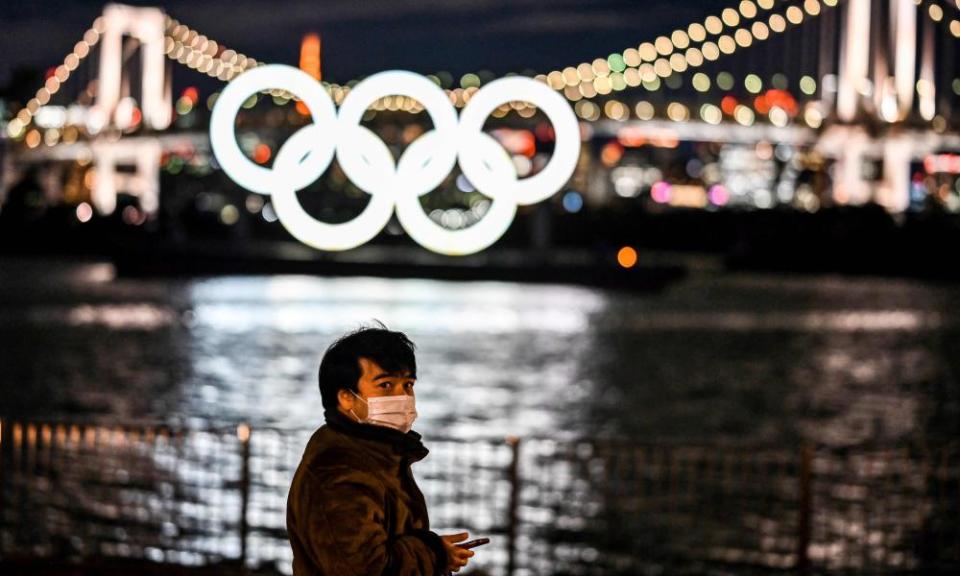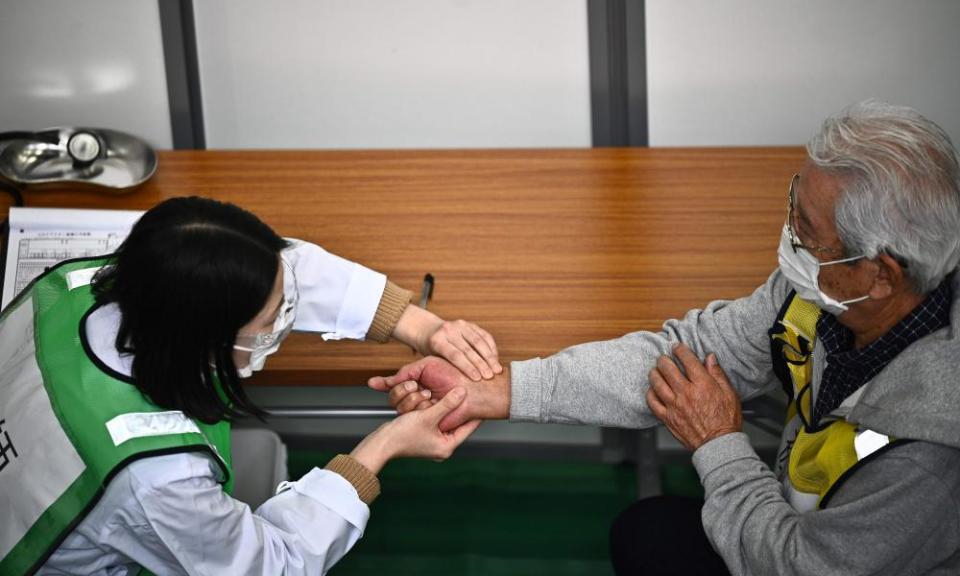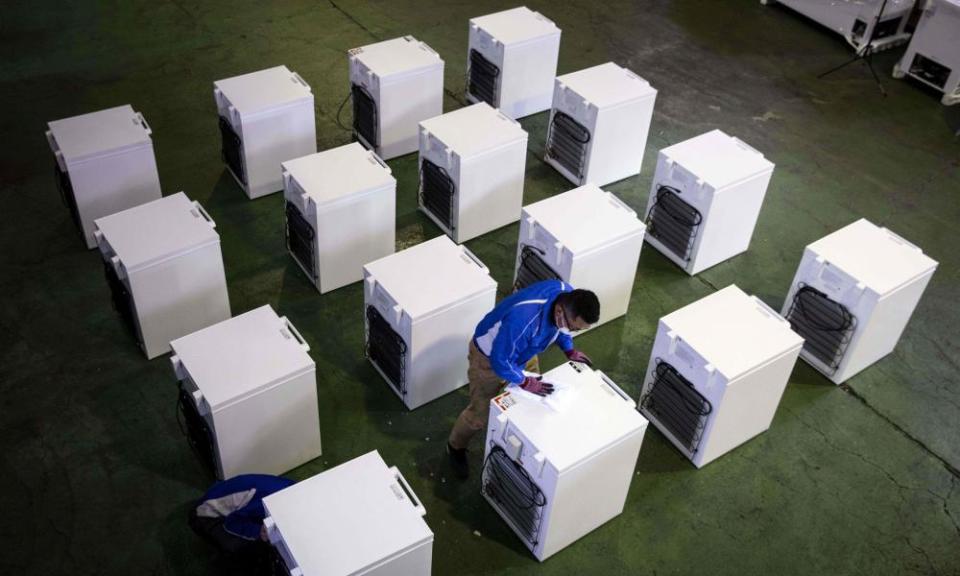Japan faces Olympian task with slow start to Covid vaccinations

Japan was among the first countries to report cases of Covid-19 after the world was alerted to the virus in December 2019. But just over a year later, it is the last major economy to deploy a vaccine – a measure widely acknowledged as the best hope for a return to something resembling normal life.
The first round of jabs is not expected to begin in Japan until the end of February, months after the US and UK – which have recorded far higher death tolls and caseloads – began their vaccination programmes.
On explaining the apparent lack of urgency, officials have pointed to Japan’s relative success in averting a catastrophic outbreak, with 373,000 cases and 5,300 deaths recorded to date.
But getting the vaccine into arms has also been delayed by clinical trials involving Japanese people that must be completed before it can be approved, and a history of vaccine hesitancy among large sections of the public.
default
According to the health ministry, as many as 20,000 frontline health workers will be the first to get vaccinated late next month, followed by other medical personnel and 36 million people aged over 65 from around April.
People with pre-existing conditions, care home staff and those aged 60 to 64 will be immunised from June, the ministry has said, but it gave no details for people aged between 16 and 60.
“I don’t think the vaccination programme is too slow,” said Masayuki Miyasaka, a professor emeritus of immunology at Osaka University. “It gives us sufficient time to take a close look at the frequency and nature of vaccine-induced adverse reactions overseas. Since mRNA vaccines [such as those developed by Pfizer and Moderna] are new to us, we should pay good attention to the possible health hazards induced by the vaccination.”

Japan’s insistence that it is preparing to host a safe Tokyo Olympics had prompted speculation that it would be among the first countries to protect its population before the expected arrival of tens of thousands of athletes and officials this summer.
The prime minister, Yoshihide Suga, described vaccines as a gamechanger in the global fight against the pandemic but said they were not a requirement for holding the Games.
“We will prepare for a safe and secure Olympics without making vaccination a precondition,” Suga said last week, as speculation mounted that the Games would have to be cancelled.
Uncertainty is growing over whether Japan will be able to deploy its $14bn (£10.2bn) immunisation programme – the biggest in its history – in time for the Games, despite ordering 310m doses of the Pfizer, AstraZeneca and Moderna vaccines, enough for every person in the country to receive two jabs.
Experts said the government had no choice but to back a cautious plan given the high levels of vaccine scepticism that can be traced back to other mass inoculation programmes.
The government faced lawsuits after a number of children who had received the combined measles, mumps and rubella (MMR) vaccine experienced adverse reactions in the late 1980s.
Japan stopped using the MMR vaccine in 1993, becoming one of only a few developed nations to shun the jab. A combined inoculation for measles and rubella is part of the national immunisation programme but parents must pay for their child to be protected against mumps.
And after some recipients of the human papillomavirus (HPV) vaccine complained of severe side-effects, the government stopped actively recommending the shots in 2013.
That decision, which studies say could lead to thousands of preventable deaths from cervical cancer, sent vaccination rates plummeting from 70% to less than 1%.
The media-fuelled controversies over the MMR and HPV jabs, which are both recommended by the World Health Organization, have left many Japanese wary about the safety of Covid vaccines.
Half of the respondents to a recent poll by the public broadcaster NHK said they wanted to be immunised against Covid-19, but 38% said they did not intend to have the vaccine.
In a Lancet study of 149 countries published in September, Japan ranked among the lowest in vaccine confidence, with fewer than 25% of people agreeing on vaccine safety, importance and effectiveness.
Vaccinating significant numbers of people by the time the Olympics are due to open on 23 July will involve an unprecedented effort by an understaffed healthcare system that is already struggling to cope with a recent influx of Covid patients.

Koichi Nakano, a political science professor at Sophia University in Tokyo, said Japan’s glacial vaccine rollout was “puzzling” given the Olympics were less than 200 days away.
“As the host of the Olympics with an interest in becoming Covid-free earlier than other countries, I do no know of any other explanation for it than incompetence by the Suga administration,” he said.
If the first jabs are administered at the end of February, Japan will have fewer than 150 days to vaccinate half its 126 million population. That would require 870,000 injections a day, with each person requiring two inoculations.
Miyasaka, who acknowledged the government had adopted an “extremely cautious” approach due to the MMR and HPV controversies, said bureaucratic turf wars were partly to blame for the delay.
“Our government is just not properly organised,” he said, adding that it could take at least another six months to cover a large proportion of the Japanese population. “A number of ministries are involved in vaccinations, and they tend to operate independently of one another.”
There are concerns, too, about a possible shortage of specialised containers to transport the Pfizer vaccine, which has to be stored at -75C.
“The government’s plan puts a big burden on the individual municipalities in giving out the vaccines,” said Koji Wada, an adviser to the government on its Covid response. “The big metropolitan areas like Tokyo may have the infrastructure to roll out the vaccinations smoothly, but more rural areas could have more difficulty.”
With Reuters

 Yahoo Movies
Yahoo Movies 